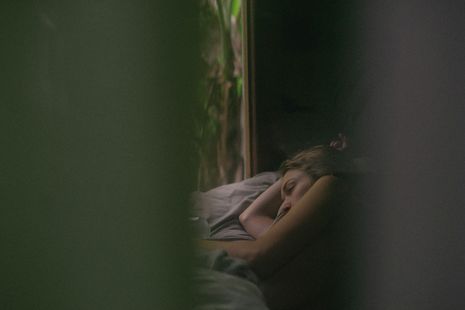My Year of Rest and Relaxation: Unlikable and Disaffected Anti- Heroines
Quincy De Vries discusses how unlikeable protagonists are handled in literature, using Moshfegh’s ‘My Year of Rest and Relaxation’ as an example

Who says you have to like the protagonist of a book? While we might expect to feel sympathy for the narrators of our current reads, authors like Otessa Moshfegh have become experts at writing unlikable and discontented female characters. In her second novel, My Year of Rest and Relaxation, Moshfegh tells the story of a young, beautiful woman living in New York City off of her parents’ money who decides to use prescription drugs to sleep for an entire year. With the help of an eccentric psychiatrist who is happy to prescribe her mountains of pills, the unnamed narrator mixes up cocktails of drugs to sleep for days. Despite the narrator’s apathy, My Year of Rest and Relaxation has become a favourite among young women in their early and mid-twenties, and repeatedly appears on ‘BookTok’ and ‘BookTube’ as a recommended read.
Moshfegh’s work is only one in a larger trend of unlikable and disaffected female protagonists. Paradise Rot, Conversations with Friends and The New Me are only a few notable examples of other works that have been published over the past few years. What is it about these characters that speak to this generation’s young women? The unabashed egotistical nature of these women is a foil to many of the women who appear in more traditional literature. Instead of the doting mother, caring lover or cheery best friend, these women are not good people. In My Year of Rest and Relaxation the narrator openly dislikes her best friend, Reva, and ignores her attempts to open up to her or be there for her when her mother dies. Reva herself can be quite unlikeable, obsessed with image and status; she is so caught up in her own life she never attempts to stop the narrator’s quest for medicated sleep. By flouting societal expectations for women, they are at once fascinating and vile, and make the book impossible to put down.
“By flouting societal expectations for women, they are at once fascinating and vile, and make the book impossible to put down”
My Year of Rest and Relaxation also ridicules typical representations of female relationships. In Reva, Moshfegh mocks the typical best friend character. Peppy and upbeat on the surface, Reva has bulimia, is engaging in an ongoing affair with her boss, and will do anything to reach the financial status and security that the narrator was born into. The narrator speculates that Reva only keeps her around because she is thin and beautiful. Reva seems disgustingly happy and optimistic in comparison with the narrator and as a reader you can’t help but wonder if any of it can be real.
Perhaps an obvious but overlooked appeal to characters like the narrator of My Year of Rest and Relaxation is that they are unhappy. These are not characters who are bitter and then go through a metamorphosis to emerge with a new outlook on life. They are unhappy and pessimistic – and they stay that way. This is especially appealing to readers who have dealt with their own bouts of unhappiness or felt lost and directionless in their lives. These characters, while horrible people, are relatable on some basic level. If you were to pull a message from any of these books, it would certainly not be ‘things will get better.’
These female anti-heroines also tap into much deeper anxieties. By shutting out the world and its problems, the narrator is able to become the centre of her own solar system and ignore the rest of the world. Who doesn’t occasionally wish they could take a break from their own lives and all the anxiety it brings, and let other people deal with the problems? This is especially pertinent for a generation of women (and men) who have grown up surrounded by social media and technology. Social media has become the perfect vehicle for comparing themselves to their peers and setting soaringly high expectations for themselves. This is also the generation raised in the midst of global warming and climate anxiety, inundated by images of a dying world and leaders who do not seem to care. It is not surprising then that the current generation of young people have been deemed “the most anxious generation yet.” The wilful ignorance and selfishness of the protagonist is surprisingly appealing, even if the readers themselves would never dare to do such things themselves.
My Year of Rest and Relaxation then has not become popular because the characters are horrible, but because they speak to the deeper anxieties and perhaps the secret wishes of its readers. In being too selfish and unlikable, anti-heroines are all the more human.
 News / Cambridge academics stand out in King’s 2026 Honours List2 January 2026
News / Cambridge academics stand out in King’s 2026 Honours List2 January 2026 Interviews / You don’t need to peak at Cambridge, says Robin Harding31 December 2025
Interviews / You don’t need to peak at Cambridge, says Robin Harding31 December 2025 Comment / What happened to men at Cambridge?31 December 2025
Comment / What happened to men at Cambridge?31 December 2025 Features / “It’s a momentary expression of rage”: reforming democracy from Cambridge4 January 2026
Features / “It’s a momentary expression of rage”: reforming democracy from Cambridge4 January 2026 News / Varsity’s biggest stories of 202531 December 2025
News / Varsity’s biggest stories of 202531 December 2025










